Cockatiel Feeding Essentials: A Complete Guide
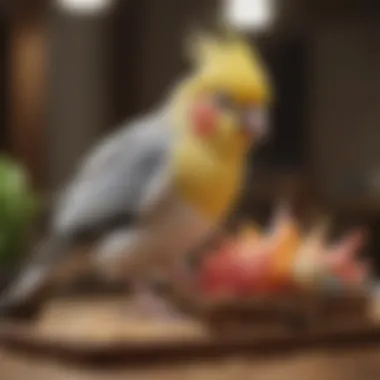
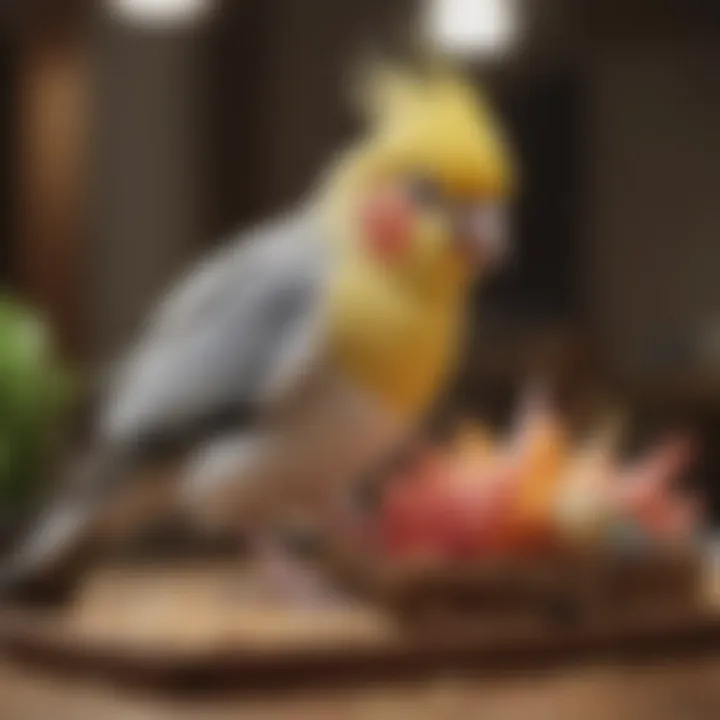
Intro
Feeding a cockatiel can seem like a simple task, yet it encompasses much more than just filling a bowl with seeds. These charming birds require a carefully balanced diet to maintain their health and vitality. Every cockatiel owner, whether new or seasoned, can benefit from understanding the unique nutritional needs of these delightful pets. This guide aims to provide a thorough understanding of cockatiel feeding practices, touching on everything from essential nutrients, to suitable food options, and effective feeding strategies.
Understanding Your Pet
Pet Behavior Basics
To fully grasp how to feed your cockatiel, it’s beneficial to understand their behavior. Cockatiels are social creatures, often displaying a variety of antics that showcase their intelligence and playful spirits. Observing these behaviors, such as vocalizations or their tendency to explore their surroundings, can provide insight into their mood and health. A happy cockatiel often interacts with its food, showing excitement at mealtime with chirps and hops.
Common Breed Characteristics
Though cockatiels share some traits, individual personalities can vary widely. Generally, these birds are curious and engaging, making them beloved pets. They thrive on social interaction and can become quite attached to their owners. This relationship plays a pivotal role, as it can influence their eating habits and preferences.
Species-Specific Needs
Cockatiels have specific dietary needs that must be addressed to ensure optimal health. Unlike some birds, they require a mix of seeds, pellets, and fresh produce. A diet comprised solely of seeds can lead to weight issues and vitamin deficiencies. Therefore, offering a well-rounded mix that caters to their species-specific needs is vital.
Feeding Guidelines
Types of Feed Available
- Seeds: Although seeds are a staple in a cockatiel's diet, they should not be the only food source. Look for seed mixes enriched with vitamins and minerals.
- Pellets: These are formulated to provide the balanced nutrition that cockatiels need. Pellets prevent selective feeding, where a bird may only eat its favorite seeds.
- Fresh Foods: Fresh vegetables like spinach, carrots, and broccoli are crucial. Fruits can also be offered in moderation, but be cautious with those high in sugars.
Importance of a Balanced Diet
Maintaining balance in your cockatiel’s diet can avert potential health issues. A varied diet bolsters the bird's immune system and keeps its feathers in top shape. Offering fresh food a few times a week ensures that they get the vitamins necessary for their overall health.
Tips for Effective Feeding Practices
- Regular Schedule: Establishing a feeding routine helps your cockatiel know when to expect meals, reducing stress.
- Monitor Portion Sizes: Overfeeding can lead to obesity. Pay attention to portion sizes suited to your bird’s age and activity level.
- Clean Feeding Stations: Regularly clean bowls to prevent bacteria growth and maintain your bird's health.
"A well-fed cockatiel is a happy cockatiel. Their eating habits reflect their health, so pay close attention!"
Health and Wellness
Routine Vet Check-ups
Regular vet visits are important to monitor your cockatiel's health, especially regarding weight and diet. This also includes dental health, as beak overgrowth can occur with improper diets.
Recognizing Signs of Illness
Being attentive to changes in eating habits or behavior is key. Signs of illness may include refusing food, excessive sleeping, or changes in droppings. Recognizing these can be vital for early intervention.
Enrichment and Activities
Socialization Opportunities
Cockatiels are social birds that need interaction, both with their human companions and other birds if safely introduced. Engaging them in playtime can create a bond that encourages better eating habits and improves their overall well-being.
Indoor vs. Outdoor Activities
While flying indoors is important for exercise, letting your cockatiel have time outdoors in a safe, supervised environment can expose them to new sights and sounds. This stimulation can help them develop healthier eating habits as they explore.
By understanding and implementing these feeding practices, cockatiel owners can nurture a healthy diet. With the right balance of love and information, your pet will flourish, becoming a lively and cherished member of your family.
Nutritional Needs of Cockatiels
Cockatiels, those charming little birds often found flitting about our homes, require a diet that supports their active lifestyle and overall well-being. Understanding their nutritional needs is crucial for any cockatiel owner aiming to ensure their feathered friend thrives. Just like us, birds need a balanced diet rich in both macronutrients and micronutrients to maintain good health.
Macronutrients
Proteins
Proteins serve as the building blocks of a cockatiel's diet. They support growth, feather development, and muscle maintenance. Given the energetic nature of cockatiels, adequate protein intake is essential for their activity levels. A key characteristic of proteins is their amino acid composition, which varies in food sources.
For instance, sources such as cooked eggs, legumes, or specific commercial pellets can offer a rich supply of essential amino acids. However, some pet owners may find it difficult to incorporate enough protein into a bird's diet, fearing it could lead to obesity or health issues. It's important to strike a balance, aiming for protein-rich yet proportionate servings in their meals.
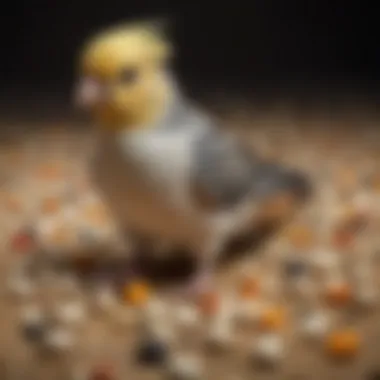
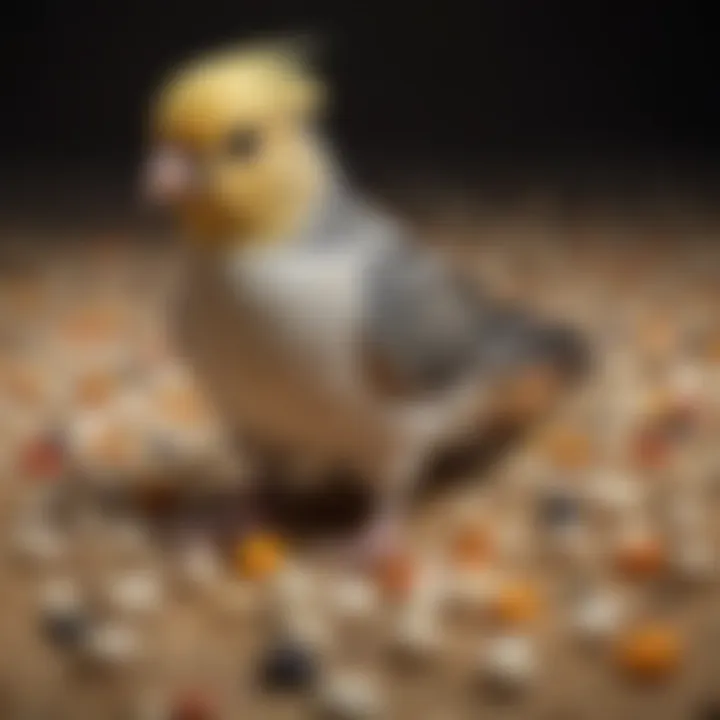
Fats
Fats play a critical role in energy provision and are vital for absorbing certain vitamins. High-fat seeds like sunflower seeds can keep a cockatiel lively and playful. However, one must tread carefully with fats; they can contribute excessively to calories in a bird's diet if not moderated. A little fat goes a long way to providing energy necessary for an active bird. Thus, selecting healthier fat sources like nuts (in moderation) can be beneficial, helping bolster heart health.
Carbohydrates
Carbohydrates are often viewed as the lesser component in a bird's diet, yet they are essential for energy. Fresh vegetables and whole grains can serve as excellent carbohydrate sources for cockatiels. Not only do carbohydrates fuel their playful antics, but they also promote digestive health. Regularly offering a variety of carbohydrate sources can keep their diets interesting while providing necessary nutrients. Nevertheless, too many simple sugars can lead to weight gain, so owners should be mindful of portion control.
Micronutrients
Vitamins
Vitamins are crucial for a cockatiel's immune function and overall health. Essential vitamins like A, D, and E support vision, skin health, and bone density, respectively. Many fresh fruits and vegetables, such as carrots and leafy greens, are rich in vitamins. Including a variety of these in their diet can prevent deficiencies that could lead to health complications. While commercial bird feeds often contain added vitamins, relying solely on them could mean overlooking natural dietary sources.
Minerals
Minerals like calcium and phosphorus are key for strong bones and egg production in breeding females. Foods like cuttlefish bone or mineral blocks are popular ways to supplement these minerals in cockatiels' diets. However, over-supplementing can lead to imbalances and health issues. Therefore, ensuring a balanced mineral intake is paramount.
Amino Acids
Amino acids, while part of protein sources, deserve a specific mention since they play a vital role in hormone production and overall metabolic functions. Providing a wide array of protein sources ensures that cockatiels receive enough of these necessary amino acids. Inadequate intake may lead to feather abnormalities or impaired growth, so being vigilant about their dietary options is crucial.
A varied diet is the key to a healthy cockatiel; including proteins, fats, carbohydrates, vitamins, minerals, and amino acids in the right proportions can prevent numerous health issues.
Ultimately, a holistic approach to feeding cockatiels, focusing on both macronutrients and micronutrients, will yield the happiest and healthiest birds.
Types of Cockatiel Bird Feed
Understanding the types of cockatiel bird feed is crucial for every pet owner who wants to ensure their feathered friends are getting the right nutrition. Different feeds have unique benefits and drawbacks, affecting the overall health and wellbeing of the birds. By identifying the best options, owners can cater to their cockatiel's specific needs, ensuring a balanced diet that promotes vitality and longevity.
Pelleted Diets
Pelleted diets have gained popularity among cockatiel keepers for several good reasons. These specially formulated pellets contain all essential nutrients in a single package, making it easier for owners to provide a well-rounded diet. Unlike other feeds, pellets don't allow cockatiels to pick and choose their favorite morsels, which can lead to dietary imbalance.
Advantages of Pellets
One major advantage of pellets is their convenience. With a pelleted diet, owners can simply fill a bowl and know their bird is getting the necessary vitamins and minerals. This one-size-fits-all approach also minimizes mess, as pellets generally create less waste than seeds. Another attractive aspect is that pellets are often fortified with additional nutrients, helping prevent deficiencies that are common in seed-only diets.
However, not every cockatiel takes to pellets right away, as they might prefer the texture and taste of seeds. Owners might have to gradually introduce pellets, mixing them with seeds or using reward-based training to encourage consumption.
Popular Brands
When it comes to choosing a pelleted diet, several brands stand out. Notably, Harrison's Bird Foods offers a variety of organic pellets tailored for different life stages. Zupreem is another well-regarded option known for its wide range of flavors that can entice picky eaters. Lastly, there's Lafeber, which combines pellets with a mix of real grains and dried fruits, enhancing both taste and nutrition.
Each of these brands provides a unique take on the pelleted diet, but owners should consider their cockatiel’s preferences and dietary requirements before making a choice.
Seed Mixes
Seed mixes, although traditional, offer a different approach to cockatiel feeding. These mixes can be quite varied, ranging from sunflower seeds to safflower and millet. Selecting the right mix means looking for a blend that offers a balanced selection to meet the nutritional requirements of cockatiels.
Types of Seeds
There are many types of seeds available, and their variety is perhaps the best characteristic. For instance, sunflower seeds are high in fat, providing energy, while safflower seeds can be beneficial for weight management due to their lower fat content. Millet, on the other hand, is usually a favorite among cockatiels and promotes healthy digestion. When fed in moderation, seeds can be an enjoyable part of a cockatiel's diet but are not meant to be the sole food source.
In addition, some owners create their own custom seed mixes, tailoring the selections according to their birds' preferences. This DIY element can be rewarding and ensures cockatiels receive a diverse diet.
Potential Drawbacks
However, relying solely on a seed diet carries potential drawbacks. One significant concern is the risk of nutritional deficiencies. Seeds can lack certain vitamins and minerals crucial for a bird's health, potentially leading to problems like obesity or feather plucking. Moreover, cockatiels might become picky if they eat seeds exclusively, choosing only their favorites and neglecting the rest of the mix.
Fresh Foods
Including fresh foods in a cockatiel's diet is essential for adding variety and enriching their meals. Options such as fruits, vegetables, and herbs can provide numerous health benefits, enhancing the appeal of their diet and keeping them engaged.
Fruits
Fruits serve as a delightful treat for cockatiels, offering both flavor and nutrition. Favorites like apples, pears, and berries are high in vitamins, antioxidants, and fiber. The natural sugars present in fresh fruits also provide energy, making them a great snack between meals. However, it's essential to offer fruits in moderation to avoid excessive calorie intake which could lead to health issues.
Vegetables
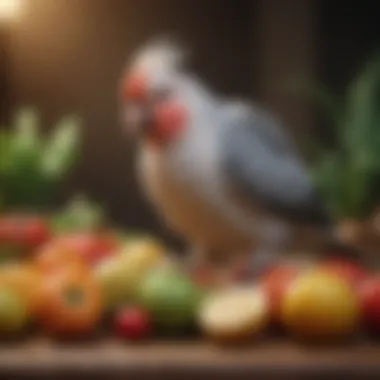
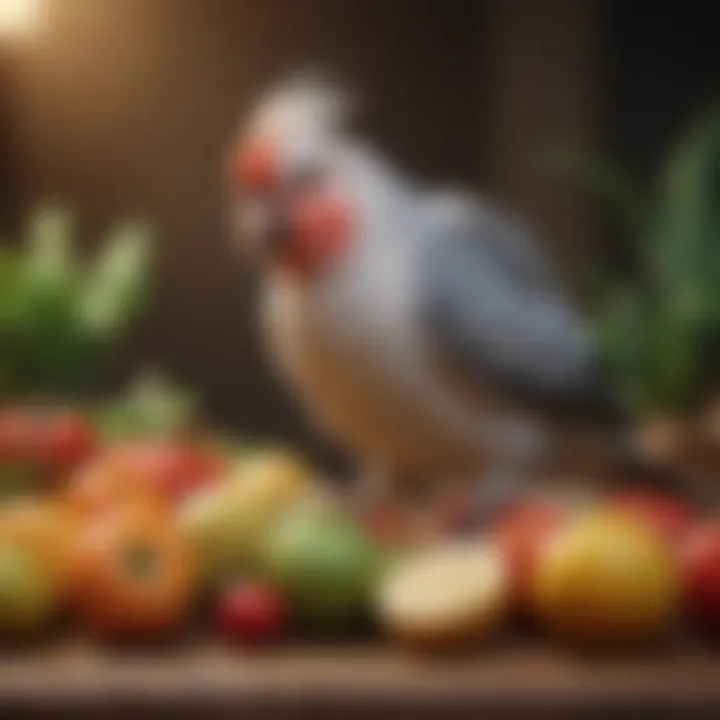
Vegetables are another component that shouldn’t be overlooked. Cooked or raw, veggies such as carrots, spinach, and sweet peppers are packed with nutrients. They can even be a excellent source of hydration. Introducing a variety of colors can stimulate interest and help ensure a broad spectrum of nutrients. However, it's crucial to wash the veggies to remove any pesticides before feeding them to cockatiels.
Herbs
Herbs like cilantro, basil, and parsley are often underappreciated in bird diets. These leafy greens not only serve as tasty garnishes but are also rich in vitamins and minerals. They can act as natural appetizing enhancers, keeping cockatiels interested in their meals. Owners should be cautious and introduce herbs one at a time to observe any potential allergic reactions.
Special Dietary Considerations
In the broader exploration of feeding cockatiels, understanding special dietary considerations is vital. Cockatiels, like any pet, require a tailored diet that addresses their unique stage of life and health status. As one would imagine, no two birds are the same. Each feathered companion presents their own nuances based on age and health conditions, underscoring the necessity of individualized feeding strategies.
Age-specific Needs
Chicks
Chicks are in their fast growth stage, needing precise nutrients to ensure they develop into healthy birds. Young cockatiels are filled with curiosity, and that energy must be supported by an abundant, well-balanced diet. A key characteristic of chicks is their high requirement for proteins and calcium essential for bone and feather development. Starter diets rich in these nutrients are crucial, and often include specially formulated pellets or mash designed just for them. However, an overabundance of high-calcium offerings can lead to imbalances, so moderation is key. The unique feature of chick diets is that they often require softer textures, which makes it easier for them to consume the food.
Adults
Adult cockatiels, having reached maturity, have different nutritional needs compared to chicks. A balanced diet involves a mixture of pellets, seeds, and fresh foods—keeping them lively and healthy. The key characteristic of adults is their activity levels and the need for a stable routine that supports their well-being. Specific ratios of fats, proteins, and carbohydrates must be maintained to prevent weight gain or loss. A common challenge for adult cockatiels is their tendency to become picky eaters, potentially leading to nutritional deficiencies. An advantage of providing a varied diet is that it keeps their palate engaged, but be mindful that too many treats can tip the scales in the wrong direction.
Seniors
As cockatiels age, their metabolism slows down, which means special dietary adjustments are necessary. Senior cockatiels have unique needs, like an increased amount of fiber to aid digestive health. It’s important to acknowledge that their beak strength might decline, so softer food options could be more suitable. This attention to senior feathery friends can support their longevity and quality of life. Notably, seniors may experience health issues that necessitate special diets; for instance, if they are prone to renal disease, a reduced-protein diet can be preferable. Thus, regular veterinary check-ups can be invaluable in tailoring their diet appropriately.
Health Issues
Obesity
Obesity in cockatiels can often stem from overeating and insufficient activity. It poses considerable risks, including shortening their lifespan and affecting mobility. The relationship between obesity and diet is crucial. High-fat seed mixes can lead to substantial weight gain if not monitored effectively. Owners must prioritize portion control and encourage physical activity through play to mitigate obesity's effects. A beneficial aspect of understanding obesity is identifying the signs early, such as lack of energy or reluctance to move, allowing for timely dietary adjustments.
Vitamin Deficiencies
Vitamin deficiencies can cloud the health of your cockatiel if not properly addressed. A common characteristic is a lack of vital vitamins, such as Vitamin A, which can lead to feather issues and vision problems. To combat this danger, diversifying the diet—introducing leafy greens, brightly colored fruits, and fortified pelleted diets—is essential. Regular observation can help catch symptoms early, ensuring timely intervention, such as adjusting the diet or consulting a vet to get specialized supplements.
Digestive Disorders
Digestive disorders can derail progress in providing optimal feed to cockatiels. They may suffer from various conditions stemming from an unbalanced diet, leading to symptoms like loose stools or a lack of appetite. A key characteristic of digestive health is the role of fiber. Incorporating fibrous foods, such as vegetables and specific pellets, keeps the digestive tract active. Understanding and responding to changes in your cockatiel's droppings can provide clues about their dietary health. Furthermore, a focus on hydration is equally vital since it helps digestion process.
Understanding these unique aspects of dietary requirements can lead to healthier, happier cockatiels. Observing their activities, preferences, and any health quirks will guide you in nourishing them appropriately.
Feeding Practices for Cockatiels
Feeding your cockatiel goes beyond just filling a bowl and calling it a day. Establishing sound feeding practices is critical for helping your feathered friend maintain good health and happiness. Cockatiels are intelligent and active birds, and their nutritional needs should be met through a structured approach. The following sections explore how to set up feeding routines and monitor dietary habits effectively, ensuring your bird thrives.
Establishing a Routine
Timing
One of the key components of managing a healthy diet for cockatiels is adhering to a consistent feeding schedule. Timing plays a crucial role in their overall well-being. Birds are naturally accustomed to routines, and having set feeding times can create a sense of security for them. What’s unique about this practice is that it offers predictability in their daily lives, which can alleviate anxiety.
Routine feeding is more than just a habit; it aids in digestion and regulates their metabolism. It’s generally beneficial to feed cockatiels twice a day, once in the morning and once in the evening. This makes it easier for owners to monitor how much food their bird is consuming. However, over time, you may notice which times your cockatiel prefers. Adapting to their preferences while keeping a general schedule can help in tuning the timing to their needs.
Portion Sizes
Understanding portion sizes is another critical factor when it comes to feeding your cockatiel. While it might be tempting to scatter food freely, careful measuring is key. The right portion size allows your cockatiel to receive adequate nutrition without overindulging, which can lead to obesity and other health issues.
A good rule of thumb is to offer a quarter cup of pellets or seeds combined with small amounts of fresh fruits and veggies each serving. Being mindful of portion sizes also helps in determining if your bird is getting enough nutrients or if it is becoming picky over time. Remember that different cockatiels may have varied portion needs based on their age, size, and activity level.
Monitoring Diet
Weight Management
Keeping an eye on your cockatiel's weight is an essential part of their feeding practice. Weight management does not only indicate if your bird is eating well but also highlights underlying health concerns. Regular weigh-ins can pinpoint if your cockatiel is maintaining a healthy weight or if adjustments in their diet are necessary.
It's best to weigh your bird at the same time each week, using a small kitchen scale to track any fluctuations. Noticing an increase or decrease in weight may signal dietary adjustments or additional health checks. For instance, if your bird is gaining weight quickly, it may be time to cut back on high-calorie treats.
Behavioral Indicators
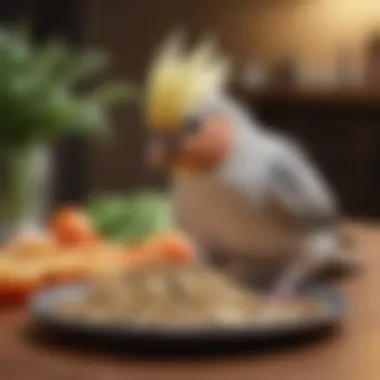
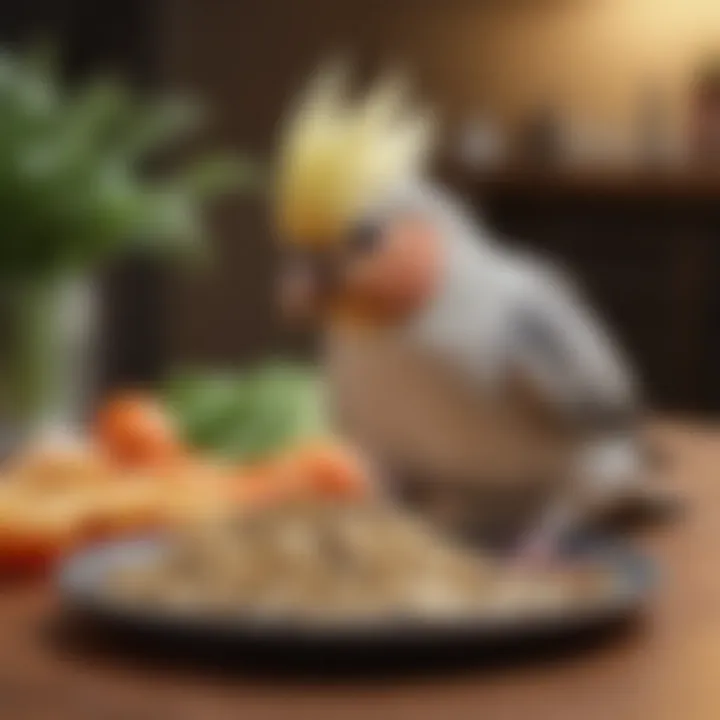
Another layer of monitoring your cockatiel’s health involves observing behavioral indicators. These encompass changes in appetite, energy levels, and overall demeanor. If your bird suddenly becomes disinterested in food or exhibits lethargy, these may be signs that something is amiss.
Behavioral changes are often linked to diet. A sudden aversion to a specific food might suggest that your cockatiel is simply bored with it. Alternatively, excessive chirping may indicate that they are searching for something more palatable. Paying attention to these signals not only aids in ensuring your cockatiel's enjoyment of its meals but also gives you insight into its health.
Key Insight: Keeping a feeding log can help track changes in both weight and behavior. It allows you to adjust practices based on observations and offers valuable insight into your cockatiel’s health over time.
In summary, fostering proper feeding practices involves establishing routines, controlling portion sizes, and monitoring various aspects of your cockatiel's diet. By focusing on these components, you contribute significantly to the health and well-being of your feathered companion.
Common Misconceptions About Cockatiel Diets
When it comes to feeding cockatiels, there's a myriad of myths and misconceptions swirling around, some of which could lead to poor dietary choices for these beloved pets. Understanding these misconceptions not only helps cockatiel owners provide better nutrition but also fosters a deeper bond with their feathered companions. It’s critical to sift through what’s true and what’s not when considering the health and wellbeing of a cockatiel.
Myths vs. Facts
Seed-only Diet
Many people think that feeding cockatiels a seed-only diet is sufficient. It’s a common belief that seeds provide all the necessary nutrients these birds need. However, this is a dangerous oversimplification. While seeds are high in fats, which may seem appealing, they often lack essential vitamins and minerals that cockatiels require for optimal health. Over time, a seed-only diet can lead to serious issues such as obesity and vitamin deficiencies, ultimately putting the bird's life at risk.
The key characteristic of a seed-only diet is its convenience. Seeds are easy to find and simple to use, making them a popular choice for many bird owners.
Unique features of a seed-only diet include:
- Caloric density: Many seeds are high in calories, which can lead to weight gain if not monitored.
- Variety of seeds: While some seeds are nutritious, others can be harmful, creating a perilous mix if birds are allowed to choose freely.
Thus, while seeds can be a delightful treat, they should only form a small part of a balanced diet that includes pellets and fresh foods.
Excessive Treats
It might seem harmless to reward cockatiels with frequent treats, but this can create a slippery slope. Treats, often sugar-laden or high in fats, may disrupt a bird's balanced diet, leading to health problems. The overarching issue here is moderation. Cockatiels have a sweet tooth just like humans, but indulging them too often can lead to obesity and bad nutritional habits.
The key aspect of excessive treats is their impact on overall dietary balance. Often touted as a way to build trust and affection, too many treats can compromise a bird's health in the long run.
Unique features of giving excessive treats include:
- Behavioral association: Birds may associate treats with certain behaviors, potentially leading to begging and demanding behaviors that become problematic.
- Nutritional imbalance: Treats can displace more nutritious foods in the diet, leading to lack of essential nutrients.
In short, while treats can be delightful, they ought to be rationed wisely to ensure a well-rounded diet.
Understanding Diet Variability
Individual Preferences
One major aspect of cockatiel nutrition that is often overlooked is individual preferences. Just like us, cockatiels have their own tastes when it comes to food. Understanding these preferences is vital for a successful feeding strategy.
What sets individual preferences apart is the way cockatiels can be picky eaters. Some might shun pellets, only to eagerly munch on fresh fruits and veggies. The benefit of recognizing individual preferences is that it can lead to better nutritional choices that keep the bird engaged and happy.
Unique features regarding individual preferences include:
- Palatability: Some foods might be more appealing than others, encouraging birds to consume a balanced diet if offered variety.
- Behavioral observation: Owners can learn a lot by observing which foods excite their feathered friends, allowing them to create a customized feeding regimen.
Species Differences
Not all cockatiels are created equally; there are species differences that affect their dietary needs as well. While the standard cockatiel diet can be generalized, adapting it to respect these differences can play a crucial role in ensuring long-term health and happiness.
Species differences often boil down to dietary preferences and nutritional requirements that arise naturally in the wild. For example, some species might favor specific seeds or fruits, which is important to reflect in a pet’s diet.
Unique features of species differences include:
- Dietary adaptability: Different species may thrive on different components of a diet, making it essential for owners to educate themselves.
- Environmental influences: Birds from various habitats might have evolved digestive systems better suited to particular foods, affecting how well they thrive on a set diet.
Epilogue: Optimal Feeding for Healthier Cockatiels
In the intricate world of caring for cockatiels, proper feeding stands as a cornerstone for their overall health and well-being. The essence of this article has been to guide bird owners toward understanding the specific nutritional needs of these charming companions. A well-informed approach can significantly reduce the risk of health problems, ensuring that your cockatiel lives a vibrant and fulfilling life.
Feeding cockatiels is not merely a task of filling a bowl. It requires a comprehensive understanding of their dietary preferences, as well as attention to their unique requirements. Selecting the right food—whether it be pelleted diets, seed mixes, or fresh fruits and vegetables—plays a pivotal role in their dietary success. Making informed choices when it comes to food can minimize the watch-out for issues like obesity, poor feather health, and deficiencies in essential vitamins and minerals.
The basis of a healthy diet involves more than just one aspect; it's a balance of macronutrients and micronutrients that all contribute to the well-being of your pet.
Moreover, establishing good feeding routines is equally important. Timing and portion sizes help regulate their eating patterns and improve weight management. Paying attention to how cockatiels react to different foods can provide valuable insights into their preferences and any potential health issues that may need addressing.
Key Takeaways
- Diverse Diet: Ensure a balanced diet that includes a mix of pelleted diets, seeds, and fresh foods to meet nutritional needs.
- Monitor Behavior: Keep an eye on your cockatiel’s behavior and weight. Changes can signal dietary deficiencies or health concerns.
- Age-Specific Needs: Consider the age of your cockatiel. Young birds, adults, and seniors have different dietary needs that you should cater to.
- Stay Educated: Knowledge is power when it comes to feeding. Stay informed about the evolving understanding of cockatiel diets.
- Avoid Myths: Be aware of common misconceptions, such as the idea that seed-only diets are sufficient.
In summary, the pathway to ensuring a healthier cockatiel lifestyle is paved with informed feeding choices. By embracing a diverse diet and attentive practices, you unlock the potential for a long, happy life for your cherished avian friend.







